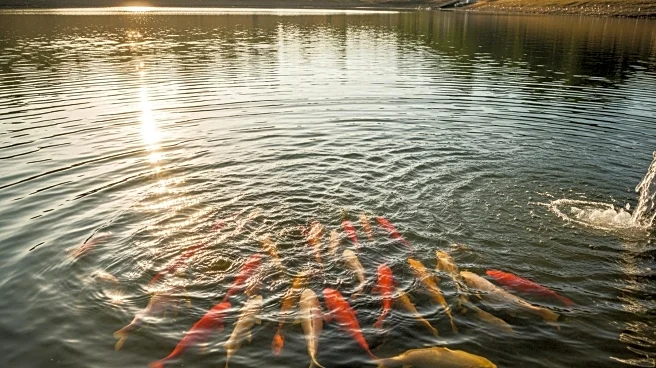What is the story about?
What's Happening?
Residents of Newtown, a town in Powys, have taken action to relocate thousands of fish from Aberhafesp Brook due to critically low water levels caused by prolonged dry weather. Dave Lister, a local resident, observed the brook had dried up completely, leaving fish gasping for air. Despite contacting Natural Resources Wales (NRW) for assistance, Lister and his friends decided to move the fish themselves after receiving no immediate response. The relocation effort included species such as salmon, trout, and stickleback. NRW later stated that moving fish during extreme conditions can be harmful, but Lister believed their intervention was necessary to prevent further fish deaths.
Why It's Important?
The situation in Newtown highlights the severe impact of drought conditions on local ecosystems and wildlife. The drying up of Aberhafesp Brook is part of a broader pattern of extreme weather affecting Wales, which has recently been declared in drought status. This event underscores the challenges faced by environmental agencies in managing natural resources during climate extremes. The community's proactive response reflects growing concerns about the adequacy of official measures to protect wildlife in such conditions. The incident may prompt discussions on improving emergency response strategies and resource management during environmental crises.
What's Next?
As drought conditions persist, further actions may be necessary to protect aquatic ecosystems in Wales. Stakeholders, including environmental agencies and local communities, might need to collaborate on developing more effective strategies for wildlife conservation during extreme weather events. The incident could lead to increased scrutiny of NRW's response protocols and potentially drive policy changes to enhance preparedness for future droughts. Additionally, ongoing monitoring of water levels and fish populations will be crucial to mitigate long-term ecological impacts.
Beyond the Headlines
The relocation of fish in Newtown raises ethical questions about human intervention in natural processes. While the community's actions were driven by immediate concerns for wildlife welfare, the broader implications of such interventions on ecosystem balance and species survival need careful consideration. This event also highlights the cultural significance of local waterways and the community's role in environmental stewardship, potentially influencing future conservation efforts and public engagement in ecological issues.
















